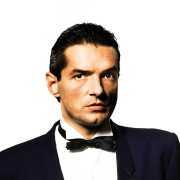Biography
Austrian singer Falcon, real name Johann Hölzel was born on 19 February 1957 to Alois Hölzel and Maria Hölzel in a working class district of Vienna. Falco died of severe injuries received on 6 February 1998, 13 days before his 41st birthday, when his Mitsubishi Pajero collided with a bus on the road linking the towns of Villa Montellano and Puerto Plata in the Dominican Republic
Falcon's mother - Maria would later recall that she had been pregnant with triplets. As it was a dizygotic pregnancy, she miscarried the identical twins during the third month and Falco, who was conceived via a separate ovum, survived. Falco mused that "three souls in one breast sounds a little over-dramatic, but I do sense them sometimes. In my moodiness. I'll be really up and then right after I'll be really down.
In 1963, Falco began his schooling at a Roman Catholic private school; four years later, at age ten, he switched to the Rainergymnasium in Margareten. Falco's father left the family while he was still a child, and he was raised by his mother.
Falco began to show signs of unusual musical talent very early. As a toddler, he was able to keep time with the drumbeat in songs he heard on the radio. He was given a child's grand piano for his fourth birthday; a year later, his birthday gift was a record player which he used to play music by Elvis Presley, Cliff Richard, and the Beatles.
Falco wanted to be a pop star from a very early age. At age 16, he attended the Vienna Conservatoire, but he became frustrated and soon left. His mother insisted he begin an apprenticeship with the Austrian employee pension insurance institute. This too only lasted a short time. At seventeen, he got conscripted for eight months of military service with the Austrian army.
In late 1970s Vienna, he became part of the Viennese nightlife, which included not just music but also striptease, performance art and a general atmosphere of satirizing politics and celebrating chaos. He played bass guitar in a number of bands under various pseudonyms, including "John Hudson" and "John DiFalco."
One such band with whom he appeared was Drahdiwaberl, an Austrian group that employed shock tactics and stage antics. It was around this time he began performing under the stage name of Falco. Despite being closely tied with the Viennese underground club scene, Falco looked uncharacteristically clean-cut.
In contrast to shabbier fashions, he had short hair (due to his military service) and wore Ray-Ban sunglasses and suits. His distinct style, coupled with his singing performance of the song "Ganz Wien" ("All of Vienna") led to manager Markus Spiegel offering to sign Falco in 1981. Ironically, it was at a concert for drug prevention and "Ganz Wien" has a line proclaiming "All Vienna is on heroin today.
Once Falco was signed as a solo artist, he continued composing his own music and hired songwriter Robert Ponger. In 1981 Falco brought his intended first single "Helden von heute" to manager Horst Bork, but received a lukewarm reception. Bork felt that the B-side "Der Kommissar" was much stronger. Falco was hesitant, since the track is a German-language song about drug consumption that combines rap verses with a sung chorus. Though beginning to break through in America, rap was still rare in Western Europe at the time. Bork insisted and the song became a number-one success in Germany, France, Italy, Spain and Japan, while charting high in several other nations.
Though "Der Kommissar" failed to break through in the UK and US, the British rock band After the Fire covered the song with new English lyrics. This version charted at number five on the Billboard Hot 100 in the U.S. That same year, American singer Laura Branigan recorded a non-single version of the song with new English lyrics under the title "Deep in the Dark" on her album Branigan 2. Einzelhaft, the album on which "Der Kommissar" appears, also topped the charts in Austria and the Netherlands.
Falco and Ponger returned to the studio in 1983 to record Falco's second album Junge Roemer ("Young Romans"). It was a difficult project, as the two artists felt immense pressure to match their previous success and the recording process was plagued by delays. Junge Roemer was released in 1984. Even though the music video for the single "Hoch wie nie" ("Higher Than Ever") was aired on prime time TV in Austria, it failed to ignite interest internationally.
In 1987, Falco went on the Emotional world tour ending in Japan. In the same year he sang a duet with Brigitte Nielsen, "Body Next to Body"; the single was a Top 10 hit in German-speaking countries. The album Wiener Blut ("Viennese Blood") was released in 1988 but it did not get much publicity outside Germany and Austria.
After 1986, there were a number of European hits, but Falco was rarely heard in the US and the UK. His 1992 comeback attempt, the album Nachtflug ("Night Flight") including the song "Titanic", was successful in Austria only.
Starting in the early 1990s, Falco lived in the Dominican Republic, where he worked on his last album from 1995 to 1998. Out of the Dark (Into the Light) was released posthumously on 27 February 1998 in Europe and worldwide in March. It charted at number one in Austria for 21 weeks.
